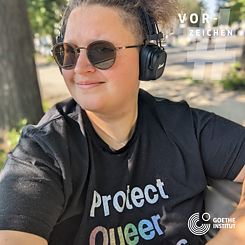Book review #15
Charlott reads 'Alles dazwischen, darüber hinaus'
Wordless, but not speechless. For her last #Vorzeichen review, Charlott read Maë Schwinghammer’s autobiographic novel, Alles dazwischen, darüber hinaus [Everything between, above and beyond]. She was captivated by the novel’s stirring and poetic narration of experiences of marginalization as well as its realization of the protagonist’s complexities.
How to find one’s own language in a world of outside ascription? How to communicate in an ableist society that rarely makes the effort to understand communication attempts outside the norm? How to narrate appropriately, when one’s own story is filled with experiences of marginalization? Maë Schwinghammer engages with these questions in her stirring and poetically told debut novel Alles dazwischen, darüber hinaus.
The autofictional novel follows its protagonist from childhood into adult life. In short vignettes, often only a few pages in length, it tells of a working-class childhood, of life in Austria and summer visits to family in Serbia, of speech therapy and the borders of communication, of bullying, of queer- and transmisia. But Alles dazwischen, darüber hinaus also tells of reconverging with parents as an adult, of friendships, and the long path to self-discovery.
“I was wordless, but never speechless” Schwinghammer writes in her acknowledgments. One particularly notable achievement of the novel is the way in which words for categorizing the experiences of the protagonist like “autism” and “genderqueer” appear relatively late in the narrative. Before that, the reproduction of insults or mostly false diagnoses from childhood—and of course many observations—appear in relation with the protagonist. This construct makes clear how concrete words and concepts become important for the protagonist in order to better navigate their own experiences, but if you listen closely (or can contextualize this through your own experiences), you don’t need these terms because it’s all already there in the small anecdotes and depictions of feelings.
Alles dazwischen, darüber hinaus takes on many subjects without them ever appearing to be too much. Instead, the novel centers a particularly unique protagonist in all their complexity, something I’ve rarely encountered before in German-language literature.
The autofictional novel follows its protagonist from childhood into adult life. In short vignettes, often only a few pages in length, it tells of a working-class childhood, of life in Austria and summer visits to family in Serbia, of speech therapy and the borders of communication, of bullying, of queer- and transmisia. But Alles dazwischen, darüber hinaus also tells of reconverging with parents as an adult, of friendships, and the long path to self-discovery.
“I was wordless, but never speechless” Schwinghammer writes in her acknowledgments. One particularly notable achievement of the novel is the way in which words for categorizing the experiences of the protagonist like “autism” and “genderqueer” appear relatively late in the narrative. Before that, the reproduction of insults or mostly false diagnoses from childhood—and of course many observations—appear in relation with the protagonist. This construct makes clear how concrete words and concepts become important for the protagonist in order to better navigate their own experiences, but if you listen closely (or can contextualize this through your own experiences), you don’t need these terms because it’s all already there in the small anecdotes and depictions of feelings.
Alles dazwischen, darüber hinaus takes on many subjects without them ever appearing to be too much. Instead, the novel centers a particularly unique protagonist in all their complexity, something I’ve rarely encountered before in German-language literature.



